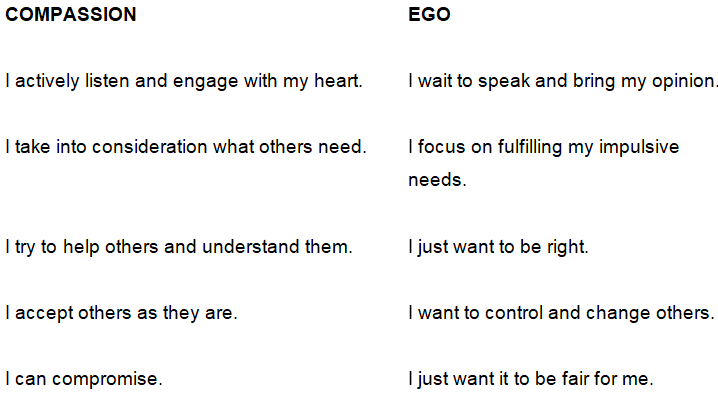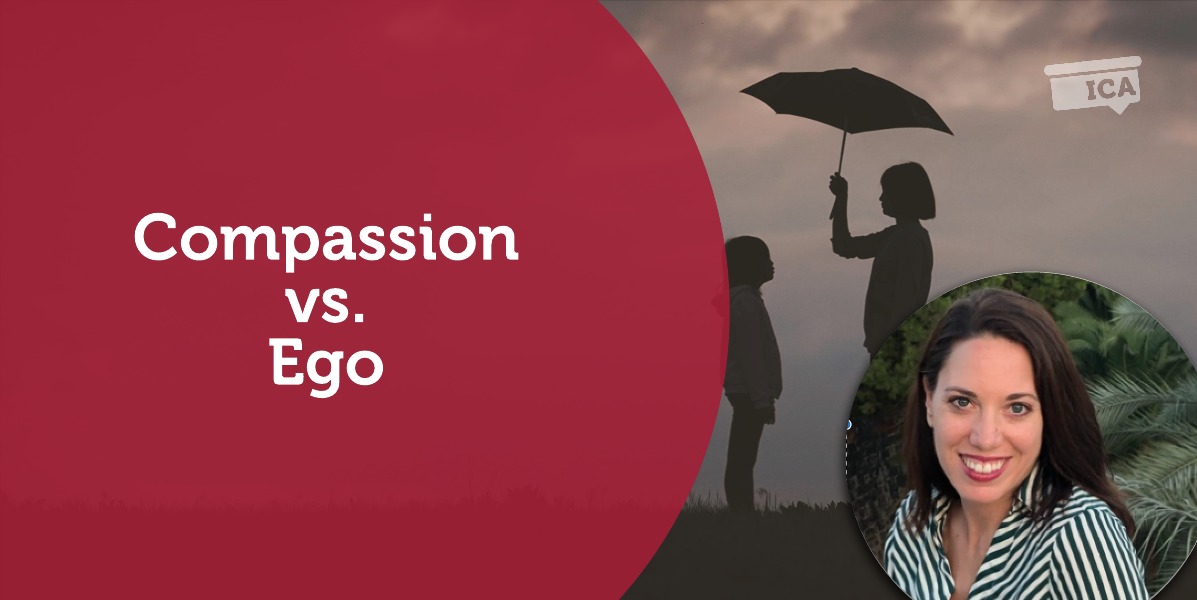A Coaching Power Tool Created by Milena Carruzzo
(Relationships Coach, SWITZERLAND)
Introduction
A relationship is defined as “the way two or more people or things are connected” and “the way two or more people regard or behave towards each other”(Lexico, 2020).
Our relationships fill up our lives and shape them. We have relationships with ourselves, with our family members, with our friends, with our colleagues, with our neighbors, with our loved ones, with our enemies, and even with things like with our country, our home, and our belongings.
Two perspectives will motivate our behaviors in our relationships: compassion and ego. The choice of perspective will have an immense impact on the quality and health of our relationships.
What is the Ego?
Literally, “Ego” means “I” in Latin. It is the “self” in the sense of self-esteem, self-confidence, or self-worth.
In the psychoanalytic sense used by Freud’s research, the ego is the part of the mind that mediates between the desires of the id – the primitive and instinctual part of the mind – and the super-ego – the moral conscience part of our mind (Simply Psychology, 2019).
In the modern field of social and personality psychology, the ego is that which creates the self (Personality and Social Psychology Review, 2009). This is the ego that is considered for the perspective.
The ego is the mind’s identity of our construction. The beliefs that we have, will define the structure of our ego. But this identity created by the ego is an illusion (Pathway to happiness, 2019).
The kind of beliefs that construct the ego is:
“I am excellent at communicating”
“I am better”
“My body is ugly”
“Nobody listens to me”
They can be positive or negative. But they are based on a false-self.
The ego will spend a lot of time defending the self and doing whatever it takes to affirm itself. It will get defensive when it gets shaken or threatened. Its primary function is to protect our identity and beliefs. The ego is maintained by the belief that we are separate from others.
The ego can be observed and show up while pursuing some of its needs. Here are the compulsive needs of the ego: (The Polyman, 2010-2020)
- Need to connect
- Need for truth
- Need to control
- Need for identity
- Need for certainty
- Need to be right
- Need to make sense
- Need for justice
- Need for recognition
- Need to defend
What is Compassion?
Compassion is defined as followed: “sympathetic consciousness of others’ distress together with a desire to alleviate it” (Merriam Webster, 2020).
I prefer this definition of compassionate: “someone who shows kindness and empathy to others, or is something or some act that expresses kindness or empathy” (yourdictionary, 2020).
It doesn’t focus on the negative feelings of others but rather on the intentions of the person to express kindness or empathy.
How do we recognize compassion?
When we practice compassion, we take into consideration the others. We demonstrate empathy, kindness, and gratitude. With compassion, we realize that there is no separation from others, we let down the barriers that we keep to protect ourselves. The desire to connect with others will come from a place of joy.
Difference between the compassion and ego
The fundamental difference between the ego and compassion is awareness. The ego is a false-self and does not have awareness of the true-self. On the other hand, highly self-compassionate people can acknowledge their imperfections and can see better their true-self. When we choose compassion, we make a conscious choice.
The moment you become aware of the ego in you, it is strictly speaking no longer the ego, but just an old, conditioned mind-pattern. The ego implies unawareness. Awareness and ego cannot coexist. –Eckart Tolle (2005)
Another main difference between ego and compassion lies in the inclusion of others. The core of the operating system of the ego is based on the idea of separation. On the other hand, the core of compassion is to feel closer and more connected to everything and everyone else.
Their differences also lie in their purpose, which is the primary issue in our relationships to anything. The purpose of the ego in a relationship is to withhold love, while the purpose of compassion is to extend love. In relationships, the ego will look at fulfilling its needs for approval, acceptance, or control. On the other hand, when we act with compassion in a relationship there is no trace of fear of loss. There is no need to control. There are just love and a true connection.
In a relationship, our ego will fight to defend ourselves and protect our needs but compassion will help us to create a more authentic and fulfilling connection.
A genuine relationship is one that is not dominated by the ego with its image-making and self-seeking. In a genuine relationship, there is an outward flow of open, alert attention toward the other person in which there is no wanting whatsoever. –Eckart Tolle (2005)
How do ego and compassion show up in our behaviors?
It is difficult to notice the ego as it hides behind the “I” and the “me”. It hides behind opinions and thoughts that appear to be true. Here are some behaviors derived from compassion and the ego.

Self applications for coaches
To actively listen to our clients, it is necessary to lower down this constant voice inside our heads. This voice is one of our egos, when it says: “why is she/he doing that”, “I know the solution” or “this is not going to work”. This is our ego tapping on our shoulders reminding us about our beliefs, our opinion, and our needs. When we manage to let those thoughts go, we can offer our full attention to our client. Quietening our ego helps us to be fully present and actively listen. By choosing compassion in our practice, we can show understanding, empathy, and focus on the needs of our clients.
Application in the coaching process
The purpose of the coaching process is to “move the client from where they are now to where they want to be” (ICA, 2019).
Self-awareness and self-reflection are essential for reaching our goals. In this process, it is important to identify the ego as the self that will do anything to decline any responsibility for negative outcomes. When we manage to quiet our ego and focus less on our needs but act with compassion, we are more likely to reach our goals. We have more chances to grow as we will no act out of fear. We will be able to recognize our truth and our true self.
In the coaching process, we support the client to get awareness and understand their behaviors. Being able to recognize the needs of the ego and the emotion derived from it, is a major step in moving forward.
Three realizations can be achieved during the coaching process:
- Realize where the ego hides and when it motivates behaviors
- Realize that the needs of the ego are never satisfied and are the cause of frustration
- Realize how to choose compassion
Powerful questions to detect the ego
The ego lives out of fear. It fears our unworthiness. As a result, the ego pushes us to achieve more. The ego communicates through “musts,” and “shoulds,” persuading us to believe that by achieving more and more, we will earn our worthiness.
Powerful questions to shift perspective from ego to compassion
The ego is focusing on fulfilling its needs whereas compassion is focusing on helping others.
X: Are the questions that serve the ego– recommended avoiding
V: Are the questions that serve compassion– recommended using
X: What are you looking for in this relationship?
V: What is the greatest gift you feel you can bring to a relationship?
X: What would you like to get from this relationship?
V: What would you like to give in this relationship?
X: What are your expectations?
V: What are your intentions?
Conclusion
By identifying our ego, we can acknowledge our limitations and consider it to develop ourselves. By integrating others in our life, we choose a life with more compassion that can bring immense fulfillment and joy.
Each of our relationships is an opportunity to glorify love. “What I give to others, I give to myself. What I withhold from others, I withhold from myself. Everyone I meet today provides me with an opportunity to increase my joy by bringing greater joy to others” (Best self, 2020).
References
Lexico, 2020, Relationship. April, 18th, 2020
Simply Psychology, 2019, Id, Ego, and Superego. April 18th, 2020
Personality and Social Psychology Review, The Concept of Ego Threat in Social and Personality Psychology: Is Ego Threat a Viable Scientific Construct, 2009. April 18th, 2020
Pathway to Happiness, What is the Ego? 2019. April 18th, 2020
The polyman, 2010-2020, 10 Compulsive Needs of the Ego Leading to Misery. April 18th, 2020
Your Dictionary, 2018, Compassionate. April 18th, 2020
ICA, 2019, The Coaching Process. April 18th, 2020
Best Self, 2020, Relationship Assignments | The Ego vs Love. April 18th, 2020
Eckhart Tolle, A New Earth, Penguin Books, 2005
